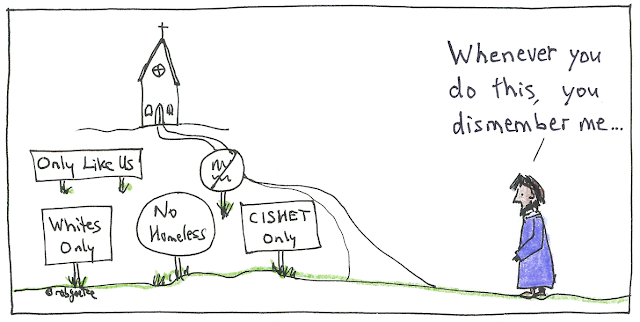Sunday, June 07, 2020
Monday, June 01, 2020
what does it mean to celebrate all people?
We will live Christ’s words: “Love your neighbor as yourself.” We will be a welcoming parish family. We love and celebrate all people regardless of age, culture, sexuality, or socio-economic status.
Related to this: two Sundays ago two women were sitting in the row in front of us. Based on their affection and physical contact, I would assume they are a couple and I wondered, how did they know this would be a safe place to be themselves? It's not a reasonable assumption to make about churches, and the public face of our church does not indicate that LGBTQ2S+ people would be welcome. Did they speak to one of the clergy in advance? Do they know someone who attends here? Were they just taking a chance on us and lucked out? I don't know.
Further related to this: P, you preached about a prophetic imagination. How might we imagine a church where all people are truly embraced and seen as an integral and needed part of the body? A church where none are shamed? A church which makes it obvious that people walking in will be loved and embraced? A church that shines its light on a hill instead of hiding it under a bushel?
Monday, May 25, 2020
[free unconscious bias microlearning lessons]
Addressing Unconscious
Bias with
Modern Learning
 Grovo has made all 20 of its Unconscious Bias Microlearning lessons available for free.
Grovo has made all 20 of its Unconscious Bias Microlearning lessons available for free.These mini lessons are 3 minutes or less, and give a quick and easy to understand introduction to the topic:
https://www.grovo.com/addressing-unconscious-bias
And while you're at it, check out the new "Learning Snippets" from Aaron Barth. The first three are free to try -- these short 5 minute lessons get you thinking about bias in the workplace and how to respond to it.
https://www.learningsnippets.ca/try3free
Thursday, April 30, 2020
another haiku for our time
Tuesday, April 21, 2020
[revision and resistance - kent monkman]
 My birthday present just arrived in the mail, and I'm super excited about it:
My birthday present just arrived in the mail, and I'm super excited about it:In collaboration with Kent Monkman and his studio, the Art Canada Institute is publishing a book on the commission and creation of his diptych unveiled at New York’s Metropolitan Museum of Art this week. Revision & Resistance: mistikôsiwak at The Metropolitan Museum of Art, which will be available for sale in March 2020, celebrates Monkman’s groundbreaking paintings with essays by today’s most prominent voices on Indigenous art and Canadian painting. (source: the Art Institute of Canada webpage)
Kent Monkman is a Cree two-spirited artist living in the Toronto area whose work I've been following for a few years. He combines traditional European painting techniques with Indigenous imagery with critiques of colonization and Eurocentric views of history.
Here is one of the two pieces that he created for the Met:
Read more about the book:
https://aci-iac.ca/news/art-canada-institute-in-collaboration-with-kent-monkman
View my post about Monkman's exhibit, "The Rise and Fall of Civilization", at the Glenbow Museum in Calgary last year.
Friday, April 17, 2020
[rise and fall of civilization - exhibit]
In the late summer of 2019, I visited the Glenbow Museum with one specific goal in mind: to see the exhibit "The Rise and Fall of Civilization" by Kent Monkman, a Cree two-spirit artist based in Toronto.
From the museum's website:

Kent Monkman’s The Rise and Fall of Civilization references the near extinction of the American bison in the 1800s when unsustainable hunting practices, used primarily by white settlers, reduced the number of bison from over 30 million to just a few hundred by the 1880s. During this time, bison or buffalo were hunted for their durable hides and their bones were used for fertilizer and in the manufacture of bone china. The buffalo meat was left to rot, decimating a food source that had sustained Indigenous peoples for generations.
(source)
Read more at the Glenbow Site: https://www.glenbow.org/exhibitions/kent-monkman-the-rise-and-fall-of-civilization/
The exhibit is long-term at the Glenbow, so be sure to check it out once the pandemic is over.
For a video about one of Monkman's other works, The Deluge, visit:
https://m.youtube.com/watch?v=OqbhG4BX6oU
All photos by rob goetze. (c) 2019.
Thursday, April 09, 2020
[inclusion lens - event management tool]
York University has a great "inclusion lens" event management tool which is very helpful for ensuring that events are as inclusive and accessible to all as possible. And even better, this tool is available to the public!
Each of the four main categories - Planning, Advertising, Implementing and Evaluating - offers a list of questions. Click on any question and it expands to show specific considerations. Click on any consideration and a tip pops up with an explanation or more information.
Here's an example from the Planning section, showing the considerations for the question: "Is your event location accessible?"
Go have a look and try it out for your next event:
https://inclusionlens.yorku.ca/
Wednesday, April 08, 2020
[god as a black woman]
"Harmonia Rosales is a 33-year-old artist based Chicago who’s doing something really powerful. She’s recreating some classical paintings, but portraying God as a black woman instead."
Here's one example of her work:
Read more:
This Artist Reimagines Classic Paintings With God As A Black Woman And They're Beautiful
Harmonia Rosales' website: https://www.harmoniarosales.com
Harmonia Rosales' Instagram: https://www.instagram.com/honeiee/
Monday, March 23, 2020
Friday, March 13, 2020
[good minds books]
Looking for good books? Here's a lot of them - all First Nations, Metis and Inuit - on one website.
Monday, March 09, 2020
[christ our black mother speaks]
An 84-page, full color collection of art, essays, questions and practices to deepen our connection to the Dark Divine Feminine.
Our conditioning has taught us to automatically perceive femininity as untrustworthy and blackness as dirty. So, black femininity is perceived as wholly unholy.
There’s something very evil about the way black women in particular are perceived as distant from the Divine. It brings to mind the Jezebel stereotype, the idea that black women are lascivious by nature, which has long plagued black women... [and] continues to thrive today...
In this volume of essays, I turn toward images of Christ on the cross. As I continue my exploration of the wholly holy female face of God, I ask a deeper question.
http://www.christenacleveland.com/shop/christourblackmotherspeaks
Saturday, February 29, 2020
the tale of the pyreneesian piranha
My great-great-grandfather lived in a small town in Europe and, it turned out based on his journals, liked to record happenings around town along with folk tales that the townspeople told. Here is his entry from January 4, 1876:
------
The Curse of the Pyreneesian Piranha
Once upon a time, there was a young man who lived by the sea. He was afraid of the sea, very very afraid of the sea and all that lived with it.
"Give me an egg or a steak or a quail or a beet salad, but keep that sea-stuff away from me and my plate!" he said regularly.
And when he grew up, the very first thing he did with money saved from his first job delivering emails, was to move to the mountains. The Pyrenees, to be precise. To Bordes-du-Lys, France, to be more precise, a little hamlet high up in the Pyrenees and about equidistant from the Bay of Biscay and the Mediterranean Sea and thus, about as far away from the sea as possible without moving to Siberia.
After a few months, he learned the habits and routines of life in Bordes-du-Lys, and took them on for himself.
So he started every day by going to the bakery down the street, to get a fresh brewed coffee and croissant.
Except for one day. A box of chocolate came in the post, anonymously, just as he was about to leave, and he decided, as a special treat, to eat the chocolate for his breakfast
Ta-a-asty, that chocolate. Good dark Swiss chocolate, with little bits of hazelnut embedded in it. Yummmeeeee.
Once the chocolate was all gone into his belly, he put the box on the kindling pile. That's when he heard a loud rumbling outside.
"What is going on???" he asked himself!
He ran outside, looking around. The sky was clear though grey instead of the usual blue. Then, turning around and looking up at the mountain, he saw it. The biggest piranha he had never seen. Bigger than anything of any sort of fish or toothy thing he had ever seen in a book. Bigger than tall skyscrapers and the mountains themselves.
And that was when he knew. By skipping his usual morning jaunt and giving in to the temptation of the chocolate instead, he had broken the rhythm of the universe. And now the universe was coming for him.
The piranha opened its mouth wider,
bigger than the sky,
lunged forward,
and SNAP!
The End.
-------
Note to regular readers of this blog: I apologize that this post does not fit into the usual theme and genre of this blog. However, I have nowhere else to post my great-great-grandfather's stories.
Thursday, February 06, 2020
Thursday, January 23, 2020
[peanut goes for the gold]
The children's book "Peanut goes for the Gold", published January 2020, is about a non-binary guinea pig.
Peanut Goes for the Gold is a charming, funny, and heartfelt picture book that follows the adventures of Peanut, a gender nonbinary guinea pig who does everything with their own personal flare....
This upbeat and hilarious picture book, inspired by Jonathan's own childhood guinea pig, encourages children to not just be themselves—but to boldly and unapologetically love being themselves.
From Harper Collins
Should be an interesting read if it meets the publisher's description.
I asked Kristi who works in education and literacy, about this. While we are not aware of particular research about this, here are parts of our conversation.
Certainly there is a positive impact when people see themselves or their own situation reflected in characters in a book, movie, TV show, etc.
A wide variety of characters and situations can be helpful to normalize a range of differences.
Seeing something first in a non-human character (like a guinea pig) who plays a human-like role might make it easier for someone who finds ideas like nonbinary new or unnerving might make it easier for them to later relate to a person who is nonbinary.
The use of non-human characters might also expand our understanding of binary. What I mean is, while some animals are clearly understood to have male and female (think cow and bull, or male and female birds with very different plumage), some others are not as obvious (think squirrels) and some ... well, I have no idea if worms even have gender. Or what about those guinea pigs? I imagine they are male or female, just like the gerbils I had as a child, but I don't think about male or female when I see one.
The connection for the reader could be the character species, the artwork, the humour, or any number of aspects of the book or show.
Kristi also said,
"I do feel it is so important for kids and adults to get a wide range of literature and if being exposed to characters in all situations helps you recalibrate and check who you are all the better. I also think it’s really important to have a huge variety because it can help 'normalize' ideas and situations too."
Would love to hear your thoughts...
















